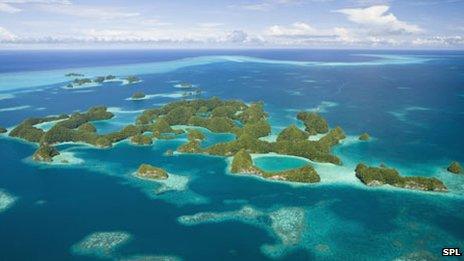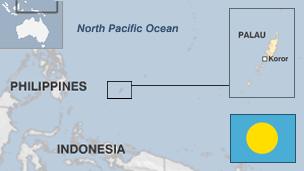Palau: Is it the world's cannabis capital?
- Published

A small group of Pacific islands with the population of a small town has been named as the country with the highest consumption of beer and cannabis. Is that really true?
The <link> <caption>United Nations' 2012 World Drugs Report</caption> <altText>UN website</altText> <url href="http://www.unodc.org/unodc/en/data-and-analysis/WDR-2012.html" platform="highweb"/> </link> , published in June, contains at least one surprising number - the nation with the highest level of cannabis use among adults is Palau.
This tiny island nation in the western Pacific Ocean is home to just 21,000 people, where - according to the UN - a quarter of adults use cannabis.
Not only are Palauans ahead of everyone else on this measure, they're ahead by a long way. The country with the next highest rate of cannabis use is Italy, where - the report says - some 15% of adults use the drug.
If the idea that Palau is some sort of hedonist's retreat sounds familiar, that may be because the island topped a 2011 World Health Organisation chart examining another vice.
According to the WHO's <link> <caption>global status report on alcohol and health</caption> <altText>WHO website</altText> <url href="http://www.who.int/substance_abuse/publications/global_alcohol_report/msbgsruprofiles.pdf" platform="highweb"/> </link> , Palauans drink more beer per capita than any other nation in the world.
So what on earth is going on in Palau? Is it really an island of beer-swilling cannabis smokers?
Let's look at beer drinking first. The WHO report was published in 2011 but it compared data from 2005.
That's important because, for some reason, Palauans appear to have gone on a drinking spree that year. They simply drank more beer than usual in 2005. In other years, they slide down the chart.
More importantly, perhaps, while Palauans seem to drink a lot of beer, they don't drink much of anything else.
If one looks at the total amount of alcohol consumed - rather than just beer - Palau slips down to 42nd place out of 188. On that measure, the Czech Republic has the dubious honour of occupying the top spot.
The UN's 2012 figures on cannabis use in Palau are more problematic than the WHO's data on beer drinking.
The report's authors could not obtain survey data for adults in Palau. So they used a survey of cannabis use among state high school pupils and extrapolated those results to estimate a figure for the whole adult population.
There is one state high school in Palau, with a student population of 742. The surveyors found that about 60% of the 565 respondents in that school had used cannabis at least once and almost 40% said they had used cannabis in the last month.
Not so much a high school, then, as a really high school. For comparison, a similar survey of schoolchildren carried out in the US found 23% of students say they used cannabis in the last month.
But although the numbers from the Palauan school survey are striking, it is clearly a very small sample, as well as being unrepresentative of the wider population (one might reasonably expect Palauan teenagers to smoke a lot more cannabis than, say, their middle-aged parents).

Koror is one of the most populous islands
Emery Wenty, a director for the Ministry of Education in Palau, simply does not believe the UN's figures.
"Palau is a very small island. If cannabis use is as prevalent as the UN claims," he says, "you would see it and smell it everywhere. You don't.
"You sort of know just about everybody. It's inconceivable that a quarter of the population uses cannabis."
Wenty accepts that cannabis use may be a problem in the Palauan state high school but he points that there are about 500 other high school children in Palau studying in private - and mostly religious - institutions.
He suspects that the data from the state high school is not even representative of all Palauan teenagers, let alone the entire adult population.
Angela Me, a UN statistician who works on the World Drugs Report, accepts some of Mr Wenty's criticisms.
There is a particular problem, she says, with collecting data from very small populations, because a small number of people changing their behaviour can create large swings in the statistics.
She points out, however, that their data - whatever its shortcomings - does suggest there is a relatively high prevalence of drug use in a number of Pacific island nations.
"We are going to have a meeting in the Pacific islands," she says, "where we hope to collect more information and also reduce the margin of error."
It would be wise to wait for the UN to complete its collection of more and better data from the Pacific islands before concluding that Palau really is the booze and drugs capital of the world.
<italic>Additional reporting by Charlotte McDonald.</italic>